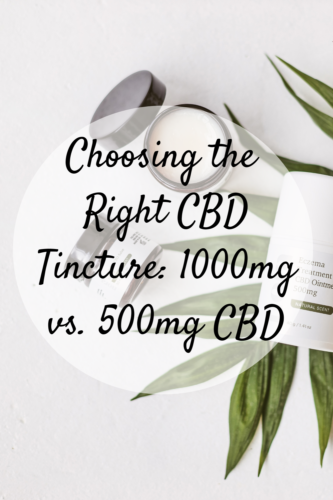
Are you considering taking CBD for health and wellbeing? It’s important to understand your options before making your decision. In this article, we will explore the different types of CBD, their benefits, and the legal status of CBD. We’ll also look at the difference between hemp plant extracts and CBD products, as well as how to determine the correct dosage of CBD to use. By the time you’re finished reading, you will have the information you need to make an informed decision about taking CBD.
Analyzing Your Options: 1000mg vs. 500mg CBD
As the market for CBD products continues to grow, many people are left trying to decide which product best suits their lifestyle. When it comes to CBD tincture 1000mg vs. 500mg CBD, it’s important to understand the differences so you can make an informed decision. The primary difference between the two dosage options is the level of CBD, but it also determines the amount of other cannabinoids that could be present as well. 1000mg CBD will provide a higher dose of CBD, and potentially other cannabinoids, than 500mg CBD, giving you more benefits for your investment. Moreover, further evaluation is required to assess the potential risks associated with taking 1000mg vs. 500mg CBD. Considering these factors, it’s important to weigh the cost of 1000mg versus the cost of 500mg and the potential immediate and long-term benefits.
The Benefits of Full-Spectrum CBD Oil and Hemp Oil
Full-spectrum CBD oil provides a greater array of cannabinoids and other compounds derived from the hemp plant, offering more of the natural compounds associated with the benefit of consuming CBD. There is a range of compounds and nutrients that naturally occur in hemp that are lost when CBD is in its isolated form, making full spectrum CBD oil a great choice for those who want to receive the benefit of the “entourage effect,” meaning the components of the hemp plant work in the concert to provide an improved effect. Hemp oil, on the other hand, is a cold-pressed oil made from the seed of the hemp plant and does not contain any cannabinoids or terpenes. Hemp oil can help support overall health. However, it contains no CBD.
Exploring Broad Spectrum CBD Oil and CBD Isolate
Broad-spectrum CBD oil is a mix of both full-spectrum and isolated CBD. Instead of containing all of the natural compounds that are in full-spectrum CBD, broad-spectrum CBD contains all of the cannabidiols but none of the natural, trace amounts of THC. In this sense, it is an in-between of the full and isolated forms and gives you the benefits of the trace amounts of THC while keeping the levels below the federally accepted limit of 0.3%. CBD isolate, on the other hand, is a processed product containing nothing but cannabidiol, with all other compounds, such as cannabinoids and terpenes, removed.
It offers the highest concentration of CBD and is often preferred by those who want to avoid any traces of THC, the psychoactive compound found in marijuana. CBD isolate is also flavorless and odorless, making it easy to add to food, drinks, and other products without altering their taste. Due to its high concentration, only small amounts of CBD isolate are needed to achieve the desired effects, making it a cost-effective option for those who want to use CBD regularly. However, some argue that the lack of other compounds found in full-spectrum CBD products may result in a less effective overall experience.
Understanding the Difference Between Hemp Plant Extracts and CBD Products
It can be confusing to understand the differences between hemp plant extracts and CBD products. Hemp plant extracts come from the entire hemp plant, while CBD products traditionally come from a specific part of the hemp plant – the flower. Hemp plant extracts include all the natural compounds found in the entire hemp plant – the cannabinoids, terpenes, essential oils, minerals, and other compounds. CBD products are more concentrated and are meant to provide more targeted effects. The difference is important to keep in mind. If you’re looking for comprehensive effects, hemp plant extracts might be the way to go. However, if you know what specific CBD compounds you’re looking for, then you might want to opt for a CBD product.
Deciding How Much CBD is Right For You
It can at times be difficult to decide how much CBD is right for you. Everyone’s body is different, and needs can vary depending on the condition you’re looking to treat. Some experts recommend starting with a small dose, around 10-25mg per day, and slowly increasing the amount until your desired effects are achieved. You may also want to consult your doctor to make sure CBD is safe for your condition. With so many different factors to take into account, there’s no one-size-fits-all approach. It’s important to experiment and find out what works best for your body. Taking a CBD dosage quiz, or speaking to a healthcare professional, may help you determine the best amount of CBD for your needs.
The Bottom Line
With the rise in popularity and accessibility of CBD products, it’s important to have an understanding of the different types of CBD available in the market. This includes full-spectrum, broad-spectrum, and CBD isolate. Another crucial factor to consider is the legalities surrounding CBD, as laws vary depending on the country and state you reside in. Additionally, it’s essential to distinguish between hemp plant extracts and products derived from them, as the former contains trace amounts of THC while the latter contains none. With all this information at hand, you are better equipped to make a decision on the right amount of CBD to consume, whether it’s 1000mg or 500 mg CBD. That said, it’s always wise to speak to a trusted healthcare professional before embarking on a new CBD regimen. They can advise you on any potential risks or interactions with other medications. Ultimately, being well-informed and proactive about your CBD consumption can lead to a better, healthier lifestyle.





Leave a Reply